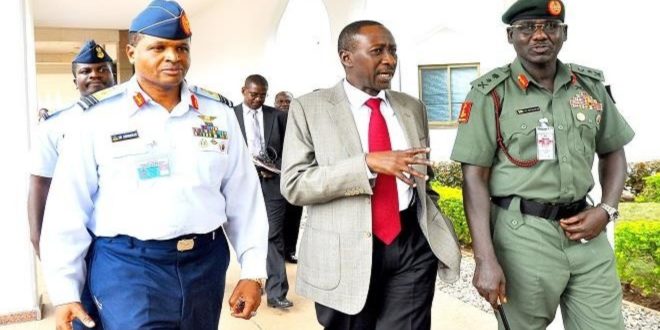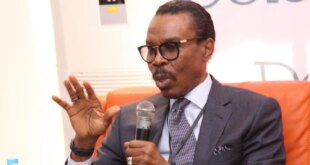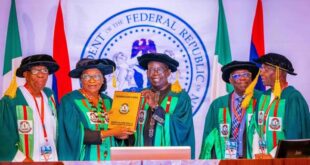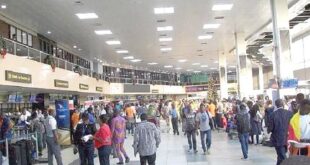By Yushau A. Shuaib
It was a tactful foresight, the decision of President Muhammadu Buhari in appointing people from Borno State into strategic positions in government, especially in sensitive areas that could address the challenges of terrorism in the country.
Nigerians expected that the Boko Haram insurgency would be history within fours years, with the appointments of the late Abba Kyari as the Chief of Staff to the President; Major General Babagana Monguno (rtd.) as the National Security Adviser and Lt. General Tukur Buratai as the Chief of Army Staff, because they are all from Borno State, the epicentre of Boko Haram terrorism in Nigeria.
Yet, the seeming rivalry between these top officers from the same state is an open secret. It would be recalled that before his death from COVID-19, Abba-Kyari was at the centre of a leaked memo from the Office of the National Security Adviser (ONSA), as well as the alleged redeployment of military personnel attached to Monguno’s office, on the order of Buratai.
Following the death of Abba-Kyari, one would have expected a smoother relationship between the brethren from Borno who are at the top of the Nigerian security architecture, especially in tackling the menace of terrorism and armed banditry, which not only impacts gravely on the situation in their home state but also that of the North and larger Nigeria.
The ONSA is statutorily empowered by the Terrorism Prevention Act 2011, to co-ordinate and support “all security, intelligence, law-enforcement agencies and military services to prevent and combat acts of terrorism in Nigeria.” On the other hand, the Nigerian Army by convention is the lead agency on counter-insurgency operations and other joint military operations involving the deployment of ground troops. Therefore, Monguno and Buratai have unique roles to play in ensuring safety, security and stability in Nigeria through a collaborative battle against criminal elements and other nefarious malefactors.
It was therefore not surprising that after spending two months with the troops in the North-East, the Chief of Army Staff, Lt. General Tukuru Buratai held a closed-door meeting with President Muhammadu Buhari and his Chief of Staff, Professor Ibrahim Gambari at the Presidential Villa on June 8.
Immediately after the meeting, Buratai told journalists that there have been “tremendous” achievements in the fight against the insurgents, and he expressed the hope that the security situation in the country would soon improve.
He said, “the troops are putting in their best and that has resulted in the tremendous successes we are recording. The fight is still ongoing and over 1,429 of this Boko Haram terrorists have been neutralised and we have arrested over 166 Boko Haram terrorist informants, their spies, couriers on logistics and their coordinators in the villages, the towns, and even the forest.”
Surprisingly, a few days later, over 80 people were killed, including soldiers and citizens, while hundreds got injured when the seemingly degraded Boko Haram terrorists invaded Gubio Village and Monguno, the hometown of the NSA in Borno.
Concerned about the unfortunate development, President Muhammadu Buhari had to quickly summon the Nigerian security chiefs to an emergency meeting on June 18.
Speaking on behalf of the President after the meeting, General Monguno castigated the service chiefs over their weak strategy and coordination in tackling insecurity. He also expressed displeasure at the lack of synergy amongst the security forces and charged them to work together in solving the security challenges.
Monguno stated that: “Mr President expressed great concern over the declining security situation in the country. He is extremely unhappy about what is happening and he feels that, even though the security agencies are doing their best, their best is not good enough for him and (he) wants an immediate reversal of the current trend and immediate reversal of our misfortunes in all their dimensions.”
In a similar interview in Hausa, Monguno specifically made a reference to one of the service chiefs as being ‘egocentric.’
Surprisingly, a few days later, a newly formed group, the Military Writers Society of Nigeria (MWSN), lashed out at Monguno over his attack on the service chiefs, especially the Army Chief, Lt. Gen. Buratai.
The group, led by one Dr. Abubakar Mohammed Sani from Borno State said that despite receiving billions of naira from the national treasury, many Nigerians still do not know what the NSA and his office have been doing to engage insurgents and terrorists, particularly through the identified carrot approach to bringing the present security challenges in the country to an end. It therefore asked Munguno to account for how security funds have been utilised under his stewardship, as this is barely impacting on resolving the security situation in Nigeria.
While one may question the rationale behind the NSA’s indictment of the service chiefs publicly, over a mission he is expected to coordinate, yet the seemingly sponsored attacks on him by those who appear to be supporters of the Army Chief are an addendum to the unnecessary distractions to the ongoing war on terrorism.
It is quite painful that while the blame-game went on unabated, Boko Haram fighters allegedly abducted some women and girls in a village in Biu Local Government Area, which is a mere stone’s throw from Buratai’s natal town. A day later the terrorists killed 9 soldiers in another attack on a military convoy on Damboa-Maiduguri highway
Despite the foregoing, the war on terror requires the sort of inter-agency collaboration that would ensure the effective formulation and implementation of comprehensive security and counter-terrorism strategies to address the protracted crisis.
Just as I clamoured in one of my recent articles, and for the sake of emphasis, towards addressing the seemingly intractable rivalry, the NSA and Service Chiefs need to devise a strategy that would involve the burying of their various differences and evolving a new collaborative security effort in the national interest, going forward. This is a period in which we need all hands on deck and to guard against unnecessary bickering within the security enforcement community.
In strategic communication, golden silence is apt, when actions become louder than words. Equally, credible bodies are better third-party endorsers, other than the recourse to charlatans media consultants who merely aggravate a crisis.
Yushau A. Shuaib
Publisher PRNigeria and Author of Crisis Communication Strategies
 The Commerce Africa African Reneissance
The Commerce Africa African Reneissance




